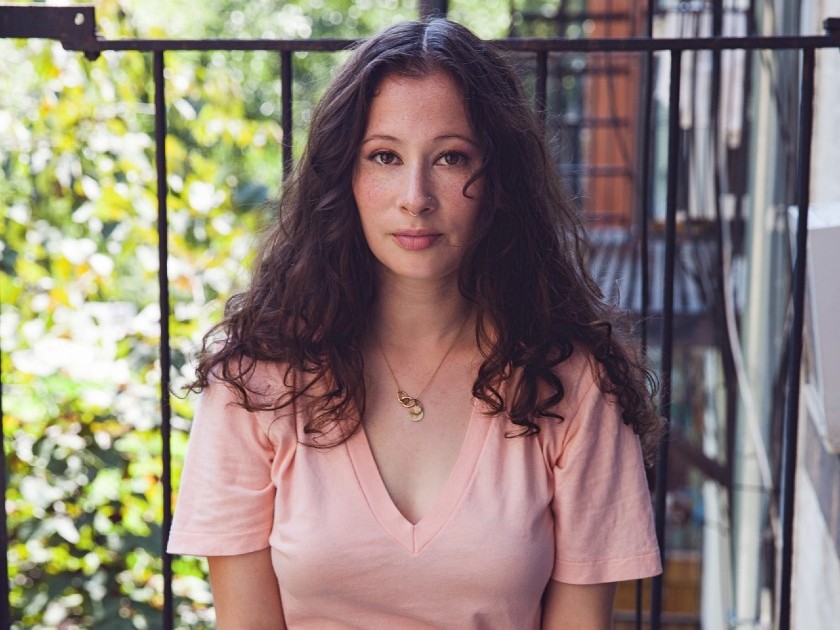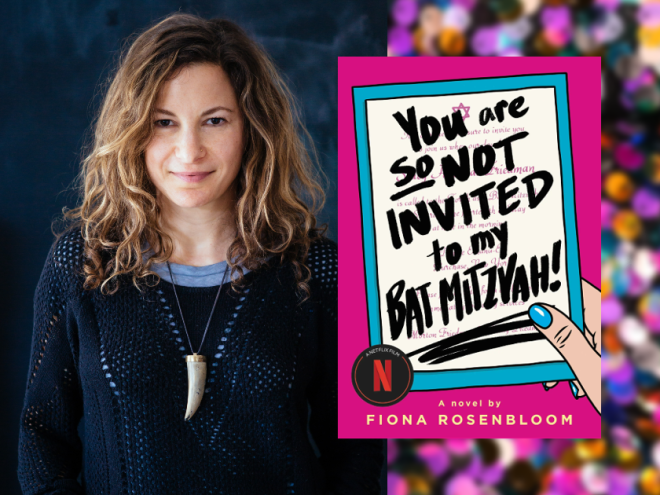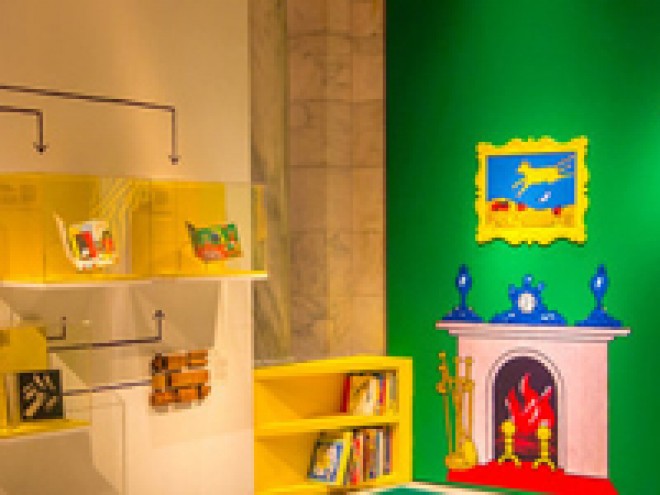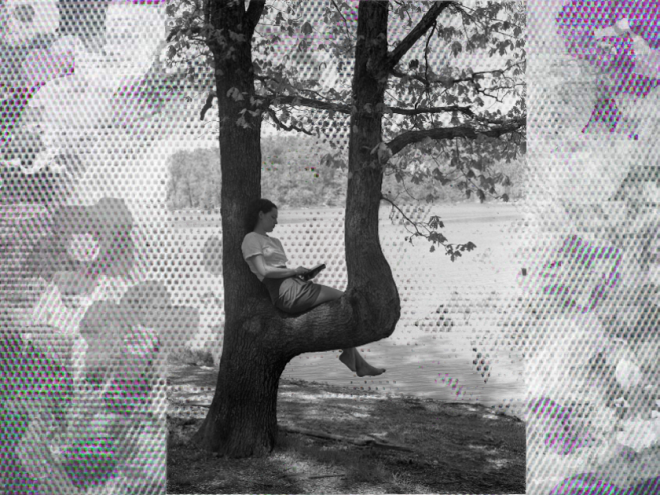
Photo by Christine Chambers, courtesy of the author
In Color Me In, a debut young adult novel by Natasha Díaz, fifteen-year-old Nevaeh struggles to claim her own identity when her Black, Baptist mother and white, Jewish father divorce. Each side of the family exerts claims on her, but Nevaeh slowly learns to make mature decisions and chart the course of her life independently. In the following conversation, Díaz discusses the connections between herself and her protagonist, the importance of portraying different approaches to Judaism, and what she hopes young readers will learn from her novel as they, too, face a world in which understanding oneself is not always simple.
Michal Hoschander Malen: Could you tell me how your personal experience is reflected in Nevaeh’s story?
Natasha Díaz: Nevaeh and I share common backgrounds; we are both white-presenting, Black, multiracial, Jewish women. We are both only children of divorced parents; we both had bat mitzvahs; we both turn to writing to figure out our emotions. And we’re both from New York (though I am a born-and-raised city kid, and Nevaeh has spent most of her life in the suburbs).
But we’re dissimilar as well. Whereas she has hardly been taught anything about her cultural heritage, I was immersed in my cultures, living in Harlem and attending both church and temple every weekend. I wasn’t raised with money the way she has been. Nevaeh goes to private school, where she’s bullied for being biracial, and I went to public schools that were diverse and progressive.
What we share most is our experiences, both specific ones — like being present while Black family members are harassed by the cops — and general ones, like the multitude of privileges that shape our lives and affect the way we are perceived and move through the world. We both endure microaggressions daily, sometimes even from family members. We’re bombarded with intrusive questions about our backgrounds and are expected to “pick a side.”
MHM: Your female characters in particular are presented as strong, resourceful, and creative. Rabbi Sarah has an interesting background and is a profound influence on Nevaeh as she emerges into adulthood. Is she based on someone you know, a composite, or simply a product of your imagination?
ND: Rabbi Sarah was one of my favorite characters to write. She is wise, but also still very much a mystery. When I had my bat mitzvah, I worked with a rabbi who was a woman, but her personality was pretty different from Rabbi Sarah’s. As I began to draft the book, I was also fortunate enough to be put in touch with a rabbi-in-training who, like Rabbi Sarah, had converted to Judaism. She helped me to understand the ways in which converts are sometimes made to feel like they don’t have a right to their Jewish identity. I wanted the rabbi character and Nevaeh to have a shared understanding of being othered by their communities, but Rabbi Sarah also shows Nevaeh how she moved past that insecurity. Rabbi Sarah found Judaism and a Jewish community and for the first time in her life, she felt seen and cared for. She learned what love is through Judaism. Her ability to stake a claim on her Jewishness is an inspiration for Nevaeh to do the same.
Sarah is the character from the book I wish I’d known in real life — someone from within the faith who saw me and gave me space to figure out how I wanted to engage. So she is mostly the product of my imagination, with some facets of real people.
She helped me to understand the ways in which converts are sometimes made to feel like they don’t have a right to their Jewish identity.
MHM: Nevaeh’s father and grandmother feel very differently about being Jewish from Rabbi Sarah (and each other). Could you talk about their perspectives on Judaism? At one point, Navaeh’s father reveals that he was called a “dirty Jew” by his classmates when he was her age, which I thought was especially interesting in light of Navaeh’s experiences at school.
ND: It was important to me to show that there are a multitude of Jewish experiences (and, for the record, my characters represent only a tiny fraction of them). Jews are members of a marginalized community and yet, Jewish people who are white and white-presenting are also privileged. In my book, I wanted to touch on the ways that white supremacy and anti-Blackness can sometimes exist within white Jewish communities. For Nevaeh and myself, that sort of prejudice and othering can make Black Jews and other Jews of color feel unwelcome. Nevaeh is being told she needs to be more Jewish by family members who feel she must erase her Blackness to do so. Is that the case all the time? Of course not — Rabbi Sarah is proof of that and to be honest, so is Bubby.
Bubby is a proud, strong-willed Jewish woman and I love that about her. But she is also someone who was raised in a bubble and is largely unaware of the widespread diversity that exists within the Jewish people. When Bubby ignores Nevaeh’s Black identity, or comments that she is displeased with the fact that her father was in a relationship with a non-Jewish woman, she belittles Nevaeh’s existence. The truth is, I don’t think Bubby means harm; I don’t even think she realizes the way she has made Nevaeh feel at first. When she does begin to understand it, we see an olive branch extended; we see her opening up to change.
Nevaeh’s father, Samuel, was a victim of antisemitism as a child, and that scarred him. It’s what led to his decision not to raise Nevaeh as a practicing Jew, which he later regrets. I wanted the prejudice Nevaeh experiences in school mirror her father’s experience as a young person. I wanted to show the way in which prejudice can have long-lasting effects, and the power that comes from confronting that pain as opposed to bottling it up. It doesn’t erase the damage or solve the issue of prejudice, but it does give one the opportunity to begin to heal.
Nevaeh, while not necessarily drawn to the religion itself, pulls from traditions and prayers and stories from Jewish history as she figures out how to take control of her future and her identity. This is another way she’s very much like me. I found it meaningful to show a secular Jewish character declaring proudly that she is a member of the Jewish community, because we are.
I found it meaningful to show a secular Jewish character declaring proudly that she is a member of the Jewish community, because we are.
MHM: Growing up in a multiracial family and with more than one religious affiliation seems to have given you and your characters interesting voices. How do you feel about the Own Voices movement?
ND: In general, I think the Own Voices movement is important and necessary. It allows people from marginalized communities to share stories and experiences that have previously been co-opted by others and misrepresented in books for decades. I hope that the industry is truly shifting in a more inclusive direction that prioritizes authentically written, diverse books. But until that happens, it is essential to highlight these stories and authors.
MHM: In her review of Color Me In for PB Daily, Brandy Colbert notes how “richly drawn” your portrait of Harlem is, and I was also struck by how beautifully you evoke New York as a whole. Do you see your book as belonging to a certain New York literary tradition? Which authors inspired you as you wrote Color Me In?
ND: Thank you! Aside from my identity as a multiracial Jewish woman, being a New Yorker is the most defining part of who I am. This city is in my blood and my heart, and I could not tell a story about coming of age without showing the impact that this city has on those of us who are fortunate enough to be raised here. I don’t know if I see myself belonging to a specific New York literary tradition as much as I hope my novel just offers a peek into a native city experience and perspective. What I hope comes across on the page is how this city thrives on multiculturalism. I feel so fortunate to have grown up in a place that reflected my family back to me when I walked down the street.
Reading James McBride’s memoir, The Color of Water, was the first time I ever felt like I saw a hint of myself represented on the page. He is a masterful storyteller and I feel incredibly inspired by his wordsmithing and his genius.
What I hope comes across on the page is how this city thrives on multiculturalism. I feel so fortunate to have grown up in a place that reflected my family back to me when I walked down the street.
MHM: Your novel is positively teeming with art. Poetry plays an essential role, and music, dance, and journal writing are featured as well. Can you elaborate on the role of creativity in your life and in your story?
ND: Absolutely. Both of my parents are writers — my dad is a poet and my mother is a playwright as well as an actor. My stepfather was an actor and a director. One of my aunts is a painter, another is an amazing storyteller, and my uncle is a rapper and DJ. One of my cousins works in fashion, and the other is an incredible artist. I’ve been surrounded by art and artistic people my whole life.
I wanted Nevaeh to express herself through art — poetry in her case. She is struggling to find her place between her two cultures, and she doesn’t have the tools yet to do that in the real world. So she figures it out through poetry first. Art is often referred to as “the great equalizer,” but I think that idea is reductive and puts an unfair burden on marginalized artists to turn their art into labor. The road to equality is paved first with an individual’s internal work to dismantle what has already been ingrained. Art gives us the chance for our truths to be heard on our terms, in our way, for our community. I wrote Color Me In because I had never seen myself in a book growing up. I could have used that, and I hope my novel offers comfort or inspiration to people who need it.
MHM: That’s wonderful. What else do you hope young readers will learn from Color Me In?
ND: So many things. I hope it will encourage uncomfortable conversations from which everyone walks away stronger — and perhaps determined to do better. I hope it reinforces the power of love, and the importance of self-love. I hope it puts a microphone into the hand of someone who feels silenced and clamps a hand over the mouths of those who take up too much airtime. I hope it encourages people not to give up on meaningful relationships, but also lets them know that sometimes it’s necessary to walk away. And I hope it shows that it’s important to hold on to the little moments, the recipes, the jokes told around the dinner table.
Michal Hoschander Malen is the editor of Jewish Book Council’s young adult and children’s book reviews. A former librarian, she has lectured on topics relating to literacy, run book clubs, and loves to read aloud to her grandchildren.



